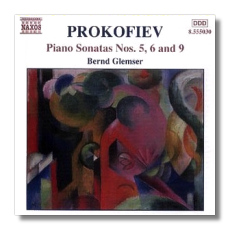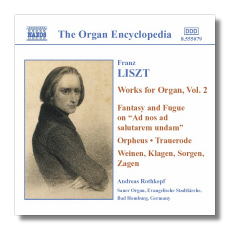
The Internet's Premier Classical Music Source
Related Links
- Latest Reviews
- More Reviews
-
By Composer
-
Collections
DVD & Blu-ray
Books
Concert Reviews
Articles/Interviews
Software
Audio
Search Amazon
Recommended Links
Site News
 CD Review
CD Review
Prokofieff / Liszt

Serge Prokofieff
- Sonata #5 for Piano in C Major, Op. 38/135 (1923/53)
- Sonata #6 for Piano in A Major, Op. 82 (1940)
- Sonata #9 for Piano in C Major, Op. 103 (1947)
Bernd Glemser, piano
Naxos 8.555030


Franz Liszt
Works for Organ, Volume 2
- Fantasy and Fugue on the Chorale "Ad nos ad salutarem undam", S. 259
- Trauerode, S. 268
- Orpheus (Transcribed by Schaab-Gottschalg)
- Concertstuck in A for organ in free style, S. 172 (Trans. Gottschalg)
- Organ Prélude on Weinen, Kleinen, Sagen, Sorgen, after J.S. Bach, S. 179 (Trans. Winterberger)
Andreas Rothkopf, organ
Naxos 8.555079
This is the final volume in Bernd Glemser's Prokofieff piano Sonata cycle, certainly among the best of the current crop. His chief competition comes from Matti Raekallio on Ondine, Frederic Chiu on Harmonia Mundi, and Boris Berman on Chandos. György Sandor on Vox is actually quite good, too, as is Yefim Bronfman on Sony. To be avoided are Murray McLachlan on Olympia and Barbara Nissman on Newport Classics, if their cycles are still in the catalogue.
If I had to choose one set of Prokofieff sonatas to take to a desert island, it would be a tough decision to make and would undoubtedly come down to Glemser and Raekallio. In the end, though, I believe I would opt for Glemser. His Prokofieff Fifth here is one of the finer versions available. By the way, Naxos bills it as Op. 38, but it is in fact the revised version, Op. 38/135. His Ninth, a bit on the brisk side in the first movement, is another splendid performance.
But, of course, it is the Sixth here which is the major entry, and Glemser acquits himself well in this challenging work. Still, he, and for that matter, Raekallio, are not as persuasive in this sonata as they might have been. Glemser attacks the opening motto with a white-heat ferocity, and he plays the lyrical second theme with insight and feeling. He does not disappoint the listener in the menacing development section that follows either, providing ample power and a sense of terror.
His second movement is light and colorful and his third lovely and dark, as they should be. The finale, too, is fine. But Cliburn (RCA), Kissin (Sony – not RCA) and several Richter recordings are at least marginally better. Two recordings by Pogorelich, the last for DG, may also challenge this one. Still, Glemser has scored a major triumph with his cycle, giving us one of the finest Sevenths and consistently solid performances of the other sonatas, none less than utterly compelling. Naxos' sound and notes are excellent. Strongly recommended.
As for the Liszt Volume Two organ music entry here, Andreas Rothkopf acquits himself well in repertory that is quite compelling. By the way, I have to speculate that if Liszt would have devoted more time to organ composition, he would have become as towering a figure in that realm as he is in the piano music genre. The 'Ad nos' Fantasy is brilliantly played here, Rothkopf divulging a deft sense for atmosphere in this large, multi-dimensional work. He fully grasps Liszt's darker aspects, his passion, his Romantic soul, his neurotic fears. One has to wonder what kind of pianist Rothkopf would make, especially in the works of Liszt. A quite good one, I would say.
The other pieces here come off well too. The transcriptions may not challenge their originals, but are still worthwhile, especially in performances this good. The Weinen, Klagen, Sorgen, Zagen was originally written for piano and is not to be confused with the larger version Liszt made for organ, S. 180. This shorter version is quite effective, as is the transcription of Orpheus. In sum, Liszt mavens and organ aficionados will certainly want this disc. Notes are informative and the sound is excellent. Another winner for Naxos.
Copyright © 2003, Robert Cummings


















